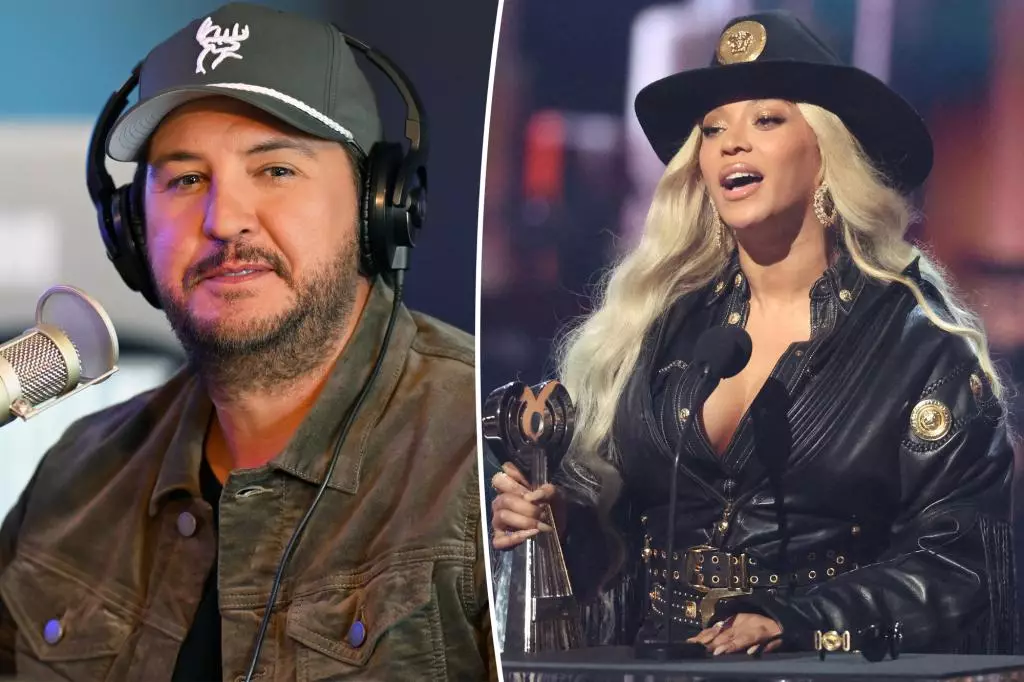The recent conversation regarding Beyoncé’s debut country album, “Cowboy Carter,” has ignited a complex debate within the country music community, highlighted by the remarks of prominent artists such as Luke Bryan. The singer’s comments reflect a common perception among some country artists that acceptance within the genre requires more than just a musical contribution. Bryan emphasized the importance of being part of the “family” of country music, suggesting that true acceptance hinges on engaging with the community and attending award shows. This perspective signals a broader issue of belonging and authenticity in a genre steeped in tradition and familial ties.
Beyoncé’s foray into country music showcases her versatility as an artist, but it also highlights the challenges faced by crossover artists. While Bryan acknowledges that her album has been well received, he implies that superficial participation in country music isn’t enough for recognition in a field often characterized by its tight-knit community. The underlying message is clear: respect for genre boundaries and heritage is paramount, and merely stepping into the genre doesn’t guarantee a warm welcome.
Interestingly, other artists like Dolly Parton and Kelly Clarkson have spoken about the barriers to entry in the country music scene. Parton, a legend in the genre, defended the voting committee of the Country Music Association (CMA), arguing that the committee’s selections are often swayed by the long-standing dedication of artists who have consistently contributed to country music. Her comments demonstrate the nuanced layers of the industry, wherein established artists wield significant influence over what constitutes authenticity.
Similarly, Kelly Clarkson shared her own struggles in transitioning into country music, recounting her experiences of being pushed to abandon pop in favor of a more niche path. These testimonies reveal a shared sentiment—breaking into the country music scene can be an uphill battle that requires adherence to traditional expectations. Clarkson’s reflections serve as a reminder that the challenges associated with genre integration are not exclusive to Beyoncé but are experienced by many artists attempting to navigate the music industry.
The reaction from Beyoncé’s fans—the Beyhive—also underscores a critical aspect of this conversation: the interplay between fan communities and their idols. With a massive, passionate following, Beyoncé’s supporters vehemently defend her contributions to any genre she explores. However, Bryan’s remarks hint at a tension between fandom and the traditional metrics of success in country music, such as awards recognition. This friction brings forward a significant question: does the presence of a dedicated fanbase equate to credibility within a specific musical community?
The sheer influence of social media in shaping perceptions also cannot be ignored. In realities where instant feedback and criticism are rampant, artists like Beyoncé confront unique challenges when stepping into long-established genres that may not fully embrace her yet. The very act of entering a new genre can lead to alienation amongst traditional fans while simultaneously galvanizing support from existing followers.
Beyoncé herself has articulated her journey into country music as a deeply personal endeavor, one rooted in her own experiences of feeling unwelcome and navigating the complexities of identity in this genre. By diving into the history of country music and reflecting on its rich tapestry, she hopes to challenge the perceptions limiting her artistic expression. Her journey resonates with many artists who have historically faced skepticism for venturing outside their initial genres.
In her own words, while the criticisms had initially stung, they became a source of motivation to explore and blend musical realms—ultimately leading to a unique body of work. The challenge Beyoncé has undertaken does not merely exist within the parameters of commercial success but rather in the pursuit of artistic authenticity, which often requires pushing against traditional boundaries.
The case of Beyoncé and her engagement with country music invites us to reevaluate the definitions of authenticity and acceptance within genres. While traditions and expectations are important, they should not overshadow the creative freedom that artists like Beyoncé embody. As the lines between genres continue to blur in the modern musical landscape, the country music community may benefit from embracing diversity, fostering collaboration, and championing inclusivity—not merely in words but in actions as well. By doing so, artists from all backgrounds can feel welcomed into the family, enriching the genre in the process.

